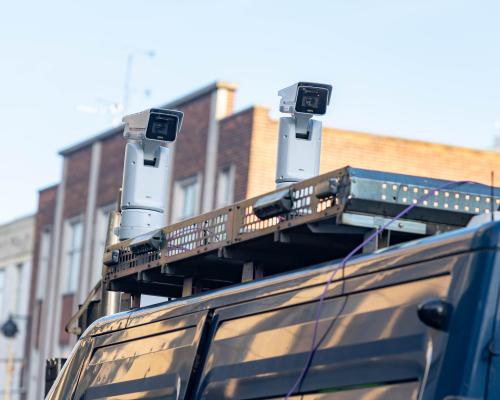
A judge has dismissed domestic terrorism charges against a defendant in connection with vandalism against construction equipment at the future site of the police training center near Atlanta, Georgia, colloquially known as Cop City, in what is seen as a win for protesters.
DeKalb superior court judge Gregory Adams ruled on Thursday that defendant Jamie Marsicano’s due process and constitutional rights to a speedy trial were violated by the state’s ongoing delays and failing to issue an indictment two and a half years after arresting them at a nearby music festival.
“The judge acknowledged that the state was delaying on purpose, which is what the public suspected and activists have been saying,” said Xavier de Janon, Marsicano’s attorney. “It’s the idea that the process is the punishment.”
Opposition to the $109m center, which opened this spring, has come from a wide range of local and national organizations and protesters, and is centered on concerns around police militarization and clearing forests in an era of climate crisis. Atlanta police say the center is needed for “world-class” training and to attract new officers.
In the last three years, the state has leveled domestic terrorism charges against opponents of the training center in DeKalb as well as Rico conspiracy charges in neighboring Fulton county, using a statute that is usually reserved for organized crime.
Marsicano faced charges in both places. In a hearing last week over the DeKalb delays, de Janon called the state’s attempt to level charges in two counties based on the same alleged acts, “trying to get two bites of the apple”. Marsicano is also likely to be one of the first of 61 defendants soon to be tried in the Rico case, the largest criminal corruption indictment ever brought against members of a protest or social movement.
Meanwhile, in the last several years, Marsicano has graduated law school in North Carolina and passed the bar, only to have the state board of law examiners decline to issue a license to practice due to the unresolved charges. Judge Adams wrote that the “personal and professional consequences that [Marsicano] has faced as a result of this indefinite charge … are forms of actual prejudice”.
“Domestic terrorism shows up on housing and job applications – it’s a deep social and political stigma,” Marsicano said.
Adams also wrote that Georgia deputy attorney general John Fowler had been using the DeKalb charges “to gain a tactical advantage” over Marsicano. De Janon noted that the state has continued to gather evidence on Marsicano despite the charges in both counties stemming from the same alleged acts, and the deadline for gathering discovery material in the Rico case having passed.
In the DeKalb hearing last week, Fowler said for the first time that delays were due in part to there being 14 terabytes of evidence – the equivalent of more than 3m photos and an amount at least two times any previous number cited by the state. “That means there’s evidence we haven’t seen,” de Janon told the Guardian.
Thursday’s decision is the second time charges have been dismissed during the three years the state has sought to punish dozens in connection to their opposition to the police training center.
Last September, Fowler dropped money-laundering charges underlying 15 of the 18 counts included in the Rico, or racketeering, indictment, against members of the Atlanta Solidarity Fund, a bail fund.
De Janon also noted that judges in several hearings tied to Cop City “have reprimanded the state” for conduct such as missing deadlines and sharing privileged attorney-client information. This, together with the dismissal of charges, “shows the state’s intense prosecution is starting to shatter”.





